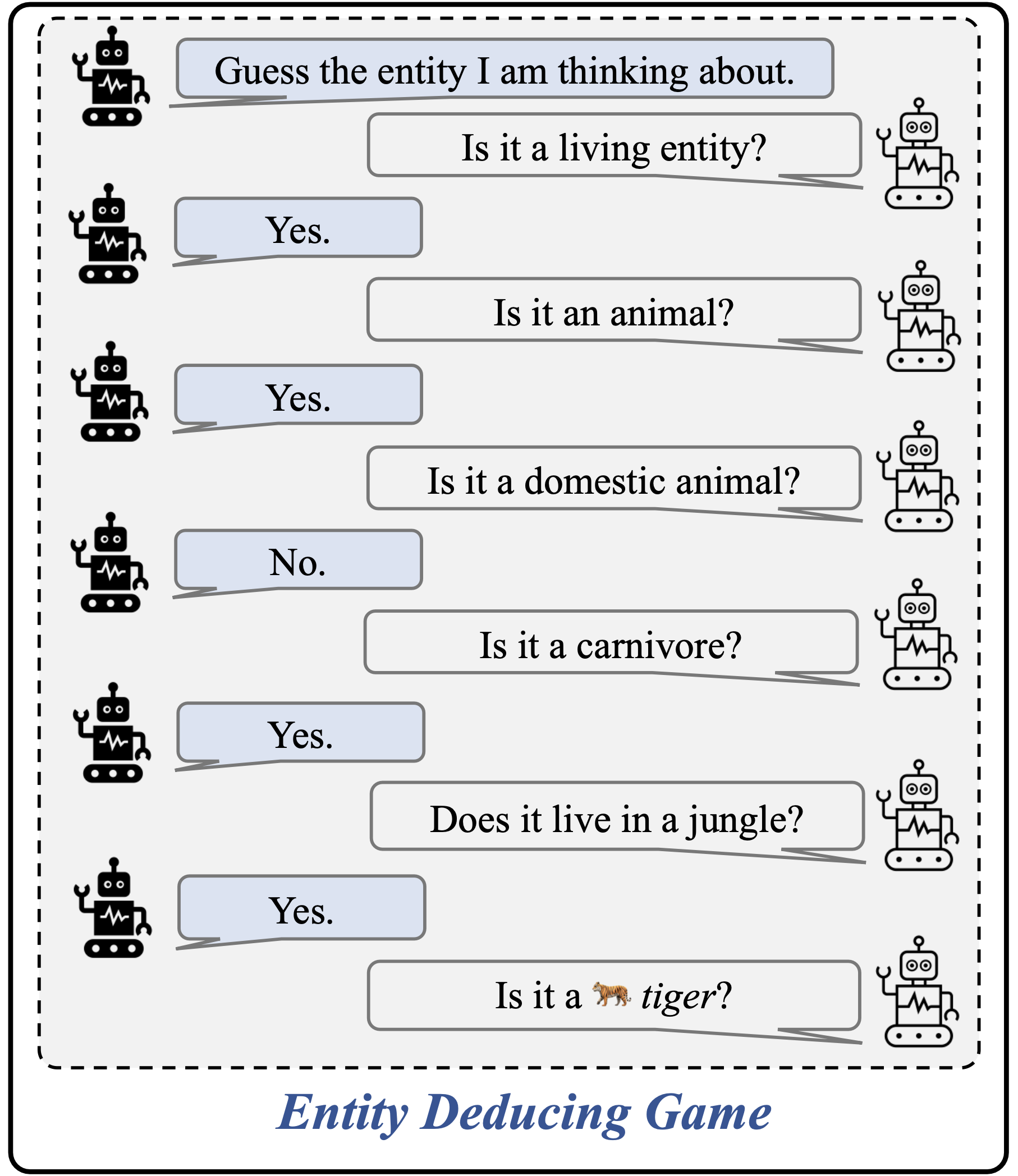This software project accompanies the research paper, Probing the Multi-turn Planning Capabilities of LLMs via 20 Question Games, presented in ACL 2024 main conference.
- There is a demand to assessing the capability of LLM to clarify with questions in order to effectively resolve ambiguities, when confronted with vague queries.
- This capability demands a sophisticated understanding of context, state tracking, deductive reasoning, and strategic planning across multiple conversational exchanges.
Run the experiments in OpenDevin
Following the instruction here.
- The Entity-Deduction Arena (EDA) is a surrogate problem that gauges an LLM's aptitude to deduce an entity by posing a series of queries to the judge.
- Through systematic evaluations, we analyze diverse LLMs and uncover noteworthy disparities in their performance on this particular task.
| Model | #Turns (↓) | Success (↑) | #Yes | Score (↑) |
|---|---|---|---|---|
| GPT-4-0613 | 17.8±0.2 | 0.31±0.03 | 5.9±0.1 | 0.26±0.02 |
| GPT-3.5-turbo-0613 | 18.2±0.2 | 0.28±0.02 | 6.3±0.1 | 0.23±0.02 |
| Claude-2 | 18.4±0.3 | 0.21±0.03 | 5.0±0.1 | 0.18±0.03 |
| Claude-1 | 18.8±0.1 | 0.16±0.02 | 4.2±0.1 | 0.13±0.02 |
| Vicuna 13B (v1.3) | 18.4±0.1 | 0.18±0.02 | 5.0±0.2 | 0.15±0.02 |
| Vicuna 7B (v1.3) | 19.5±0.2 | 0.09±0.02 | 5.7±0.2 | 0.07±0.02 |
| Mistral 7B Inst v0.2 | 18.9±0.1 | 0.13±0.02 | 3.8±0.5 | 0.11±0.02 |
| Model | #Turns (↓) | Success (↑) | #Yes | Score (↑) |
|---|---|---|---|---|
| GPT-4-0613 | 17.3±0.1 | 0.50±0.02 | 6.8±0.2 | 0.40±0.02 |
| GPT-3.5-turbo-0613 | 18.8±0.2 | 0.27±0.03 | 7.4±0.2 | 0.21±0.03 |
| Claude-2 | 17.6±0.2 | 0.31±0.02 | 5.6±0.1 | 0.26±0.02 |
| Claude-1 | 17.7±0.2 | 0.29±0.03 | 5.3±0.2 | 0.25±0.02 |
| Vicuna 13B (v1.3) | 18.7±0.2 | 0.22±0.03 | 6.1±0.1 | 0.18±0.02 |
| Vicuna 7B (v1.3) | 19.6±0.3 | 0.06±0.02 | 5.9±0.2 | 0.05±0.02 |
| Mistral 7B Inst v0.2 | 18.2±0.1 | 0.22±0.04 | 4.3±0.1 | 0.20±0.03 |
The dataset can be also downloaded by
from datasets import DatasetDict, load_dataset
def load_my_multi_split_dataset():
things = DatasetDict({
"train": load_dataset("yizheapple/entity-deduction-arena", name="things", split="train"),
"dev": load_dataset("yizheapple/entity-deduction-arena", name="things", split="dev"),
"test": load_dataset("yizheapple/entity-deduction-arena", name="things", split="test")
})
celebs = DatasetDict({
"train": load_dataset("yizheapple/entity-deduction-arena", name="celebs", split="train"),
"dev": load_dataset("yizheapple/entity-deduction-arena", name="celebs", split="dev"),
"test": load_dataset("yizheapple/entity-deduction-arena", name="celebs", split="test")
})
return {"things": things, "celebs": celebs}pip install -r requirements.txtexport OPENAI_API_KEY="sk-XXXX"Example usage:
# GPT3.5 play against GPT3.5 on Things.
python GPT_Q20.py --input data/things/list_of_things_eval.txt -g gpt-3.5-turbo
# GPT4 play against GPT3.5 on Celebs.
python GPT_Q20_celebrity.py --input data/celebrities/list_of_people_eval.txt -g gpt-4
# Vicuna 7b play against GPT3.5 on Things with 5 repetitions.
python GPT_Q20.py --input data/things/list_of_things_eval.txt -g lmsys/vicuna-7b-v1.3 --openai-api False -s hf --num-sessions 5The execution of the above command will create of an output folder named ./data/<model_name>. This folder contains the game play sessions for all the tested entities.
Required:
-
--input: Specifies the input data to the script. -
-g, --guesser_model: Specify the model for guessing. Examples: gpt-4, gpt-3.5, gpt-3.5-turbo, claude-1, claude-2, lmsys/vicuna-7b-v1.3, lmsys/vicuna-13b-v1.3, meta-llama/Llama-2-13b-chat-hf ...
Please note that when using models from the huggingface hub or from a local path, such as lmsys/vicuna-7b-v1.3 or /mnt/ckpts/checkpoint_400 (a local path), you need to set --openai-api to False in order to load the model correctly. Alternatively, you can set up an openAI API server from the checkpoint as per the instructions provided in the FastChat repository. In this scenario, --openai-api should remain True.
Optional:
-
--answerer_model: Specify the model for answering questions. Default to GPT-3.5-turbo -
--suffix: Optional suffix to modify output or data. -
--user: User name for user mode -
--turns: Set the maximum number of turns for the game. -
--temp: Set the temperature for model sampling. -
--num-sessions: Set the number of sessions or iterations. -
--openai-api: Whether or not to use OpenAI API server for the guesser model. Default toTrue.
Specify the model as <your_model>. If opting for a model path, set --openai-api False.
for rep in 1 2 3 4 5; do
python script/eval_result.py --dir ./data/<your_model>_rep${rep}
doneThen running the following code to compare and summarize all the results across models in the entire folder:
python script/breakdown_stats.py --dir ./dataComing soon.
Please consider citing our work if it is helpful to your research.
@inproceedings{zhang2023entity,
title={Probing the Multi-turn Planning Capabilities of LLMs via 20 Question Games},
author={Zhang, Yizhe and Lu, Jiarui and Jaitly, Navdeep},
journal={ACL},
year={2024}
}
Poster for the entity-deduction arena

